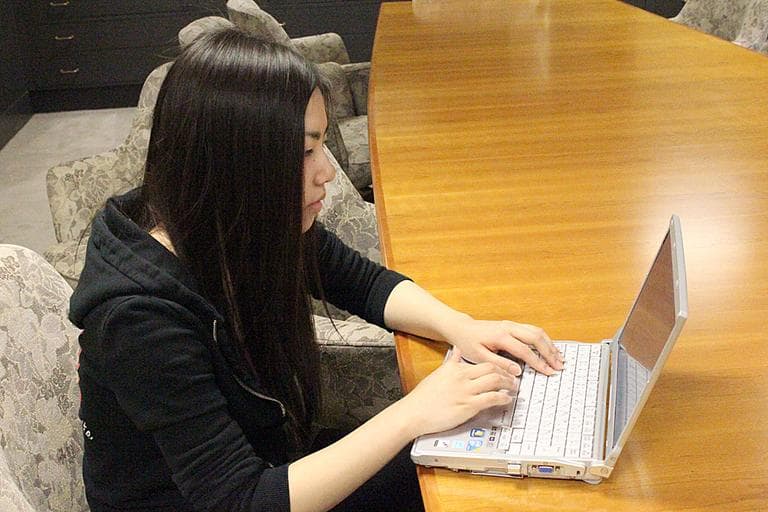Advertisement
Japanese Students In Boston Connect With Ravaged Homeland
Resume
Japan's devastating earthquake, aftershocks, tsunamis — and now the nuclear power plant crisis -- are rattling people’s emotions here in Boston, especially those with family and friends halfway across the world.
Young Japanese students at Showa Boston — a satellite campus for Showa Women’s University in Tokyo — are trying to cope with the horrific news, but also the sense of distance they feel.
Yui Tomoe has been glued to her laptop since the earthquake struck. She can't take her eyes off the constant stream of news reports and videos from her homeland. Together we watched footage of the tsunami waters sweeping away crushed homes, cars and debris.
"With Facebook and Twitter, it was the key for them to find out within a half a day if their parents and friends and family were OK or not."
Kenji Yuasa, Showa Institute
"There were many people saying there's going to a big one coming, but I'm just surprised and shocked," she said.
Tomoe is 19 years old and said Japan is the "country of earthquakes" — so everyone, from a very young age, is trained to deal with them.
"But this kind of big earthquake — we didn’t expect it," she admitted.
Tomoe’s been studying in Boston for the past six months. She’s one of about 180 students at Showa Institute, near Jamaica Pond in Jamaica Plain. They’ve all been reeling since they first heard the news last week.
"I was doing my homework with my friends, and another friend came screaming there was a big earthquake. Bigger than the one in Kobe," Tomoe recalled. "And we soon opened our laptops and started to figure out what was happening, and we figured out it was magnitude 8.8, and the biggest one in Japan."
She said she and her classmates were afraid for their parents, family and friends. Phone lines were down, so Tomoe tried Google e-mail to send messages to cell phones in Japan. That didn’t work. Next Skype. Then Facebook. Also a Japanese version of Facebook called Mixi.
"But it took me four hours to hear from them," Tomoe said with a sigh.
Her sister responded first, through Facebook. "She gave me comments that she’s OK," Tomoe said.
Her sibling is in Saitama prefecture, where Tomoe's parents also live. It’s about an hour north of Tokyo. And while it wasn’t directly hit, the area has been affected by rolling aftershocks and an infrastructure breakdown. Tomoe's sister filled her in on their parents.
"The place where my mother was, it wasn't so bad," Tomoe's sister told her, "but my father was trapped."
Tomoe's father was trapped in a train station. Then he was forced to stay overnight in his office building. When Tomoe finally spoke to her mother she assured her that her father made it home and was safe, too.
"She’s always calm," Tomoe said of her mom, "she said, ‘don’t worry, I’m OK’ and tried to make me calm."
It worked, Tomoe said.
Even so, just imagine being 19 years old and half a planet away from everyone you love — in the middle of a national disaster.
"Even though we're not in Japan, Japan is our home. And even though we're Japanese, we can't actually help our friends and family," Tomoe said.
It has been making her feel impatient, she said. And helpless. But Tomeo is definitely not alone. She and many of her fellow students have been getting help from Kenji Yuasa. He works in the Student Service Department at the Showa Institute and said everyone — himself included — feels emotional and disconnected. But social media networks have been playing a critical role.
"With Facebook and Twitter, it was the key for them to find out within a half a day if their parents and friends and family were OK or not," Yuasa said. If this calamity had happened even just a few years ago, these young girls would have been cut off from their country.
Back at her laptop Tomoe showed me a few more messages on Mixi.
"My friend from my high school is saying that our high school is now a shelter and people escaped," she said. Another person wrote, "they can still feel their houses shaking because of the aftershocks," and "thank you for worrying about us."
Tomoe went on to type some encouraging words to her friends back home. She wants them to know that a group of students at Showa Boston have decided to buy wristbands launched by Lady Gaga to raise money for disaster relief in Japan.
"Even though we are far away we can still think of each other and help each other — by words, by text mailing," she said with a pause, then added a wistful, "Yea," before turning her gaze back to the small, rectangular screen.
This program aired on March 14, 2011.
